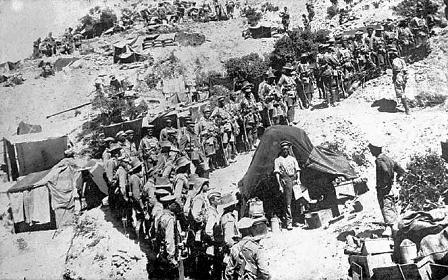05 September 1915
ANZAC - Brigadier General John Monash, 4th Brigade, A&NZ Division, AIF - In a letter of to his wife written on 5 September Monash pondered the results of the recent operations.
P hotograph: AWM P02536.002 A platoon of the 13th Battalion, 4th Brigade, AIF, awaits an address by its commander Captain Joseph Lee, in the Sphinx Gully, probably prior to the brigade's night march on 6–7 August 1915.
hotograph: AWM P02536.002 A platoon of the 13th Battalion, 4th Brigade, AIF, awaits an address by its commander Captain Joseph Lee, in the Sphinx Gully, probably prior to the brigade's night march on 6–7 August 1915.
"Exactly a month ago we were in the midst of our final preparations for the recent offensive operations which have now been brought to a temporary close, largely through the entire exhaustion of the resources and forces on both sides. At last we have come to anchor in an entirely new part of the defensive line, a much shortened frontage to suit my reduced numbers, and from all I can gather we are likely to stay here; quite a long time. We colloquially talk of our present location as our 'winter quarters', although I do not seriously believe yet that they are going to keep us here inactive into the actual winter. What we really mean is the expectation of the early arrival of the rainy season, and I am now busy making what preparations we can, with the limited means available, for the wet weather. No doubt things will be very disagreeable indeed and we shall all be mud and clay from head to foot. Well to sum up recent operations calmly and dispassionately, I am afraid it must be admitted that Ian Hamilton’s plan in its entirety has so far failed to achieve the main objective, and this has tended to overshadow the many minor successes and the brilliant achievements of the Australian troops and the New Zealanders. It is the old story - insufficient troops, inadequate munitions, attempting more than was possible with the means available. To assist the Australian and New Zealand Army Corps they sent three divisions of K.1 and one of Territorials and the 5th Australian Brigade (under Holmes) arrived in the middle of the operations. We also had Cox’s Indian Brigade. The job was the complete conquest of the Sari Bair Range, but we succeeded only in getting a lump of it, and a fair lump too - but not all. The Turks have contested our advance inch by inch, and have fought with the greatest bravery and skill - but we steadily gained ground every day. The Turkish losses have been enormous, but our losses have been heavy too - so heavy that we can now do no more than hang on to what we have gained and wait for reinforcements. As an index of our losses, I marched out of Reserve Gully on 6 August with 3,350. My parade state today is 1037. I have left, in the whole brigade, two lieutenant colonels, five majors, three captains, and twenty-two lieutenants (out of a total of 136 officers) - of course many of these are lightly wounded. sick, and will rejoin later. Much of the fault with the British troops lay in leadership; the officers do not mix with the men as we do, but keep aloof, and some senior officers appeared chiefly concerned in looking after themselves and making themselves comfortable. It only shows how hard it is to make an army after a war has been started. I hope Australia will learn the lesson, and England too, and that the lesson will not prove a bitter one. But the Australians are uniformly splendid, I suppose I have now only about 300 of those who left Melbourne with me. All the rest are reinforcements not near so well trained, yet the right spirit is there and they are so adaptable that in a week or two they are almost as good the old hands. Result - although we have gained enormous new tracts of country, our strategic or tactical objectives are still unreached, although within easy reach with a few brigades fresh, good troops and plenty of gun ammunition. I still on a very strict daily ammunition allowance, which in rather a bother when one gets good targets or wants proper preparation for an infantry offensive. Why is it that Great Britain always embarks on her military enterprises with inadequate means at first and only makes up the needed deficiencies after losses due to such inadequacy."
"SOURCE:
J. Monash quoted by F. M. Cutlack, War Letters of General Monash (Australia: Angus & Robertson Ltd, 1934), pp.65-67
